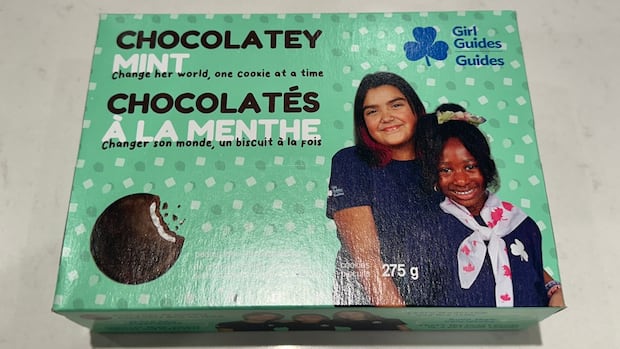B.C. Girl Guides has issued a warning after a number of social media users complained about getting scammed while trying to purchase their popular mint chocolate cookies online.
Users in a Facebook group in Campbell River, B.C., highlighted posts that showed users saying their daughters — purportedly part of the Girl Guides — needed to sell cookies and were willing to deliver them.
But once the users accepted an e-transfer payment — sometimes for as many as three or four $6 boxes of cookies — they would simply stop replying.
With the volunteer-run Girl Guides organization saying their cookie fundraisers are critical to their activities, the scams are leading to warnings about how to stay safe online.
Cookie lovers be warned, a new online scam is overcharging and under-delivering for a popular treat. As Yasmine Ghania reports, fraudsters have been posing as Girl Guides cookie sellers on community forums and tricking people into paying for the non-existent sweets.
“To my knowledge, we haven’t seen a scam attempt like this before,” said Diamond Isinger, the volunteer spokesperson for B.C. Girl Guides.
There were over 12,600 girls registered with the organization in B.C. in 2024, according to the Girl Guides’ annual report. It sold five million boxes of cookies across Canada last year.

“Girl Guide cookies power everything that we do as an organization,” Isinger said.
“They are the largest fundraiser — powering activities, supplies, badges, training for adults, and everything in between.”

Isinger said there were a number of reliable ways to find cookies in your community — from door-to-door sales to booths set up at public locations, some of which can be found on the Girl Guides website.
“We are obviously concerned about seeing examples like this out there in the wild, but we hope that they don’t discourage any of our supporters from supporting a really essential program for kids and youth and adults,” Isinger said.
Police, expert issue advice
Campbell River RCMP spokesperson Const. Maury Tyre said the detachment hadn’t yet received any official reports of cookie scams — but they were aware of the social media posts.
He said that it’s best practice to not pre-pay or provide deposits for items while buying through sites like Craigslist or Facebook Marketplace, noting that Facebook profiles are often bogus.
“Investigate the page of the person you are buying from,” Tyre said in an email. “Oftentimes, brand new pages denote someone who has created a fake or new page in order to operate a scam.”

Tyre added that any transactions should ideally be made in a public location, and anyone who posts in a public forum seeking items should be wary of scam offers.
Scams like the ones involving Girl Guide cookies are not victimless, says David Shipley, CEO of Beauceron Security.
“There’s a cost to this kind of fraud that goes beyond the amount lost for a box of cookies here and there,” he told CBC News.
“It’s the widespread loss in trust and the impact on [the Girl Guides’] brand. And that’s so profoundly unfair to this organization.”
Montreal sellers on Facebook Marketplace say they’re facing a new type of scam. Deceptive buyers are trying to gain access to sellers’ banking information by sending a fake e-transfer link.
He advised anyone who got scammed to report it to their local police or to the Canadian Anti-Fraud Centre, which received over 100,000 fraud reports last year involving over $638 million in reported losses.
Shipley said the federal government has been lagging on the issue of online safety for a decade, and groups like the Girl Guides were suffering as a result.
He said Ottawa should hold big platforms, like Facebook’s parent company Meta, accountable.
“We can expect more, and should demand more, from companies like Meta to stop these scams proliferating on their platforms,” he said.








